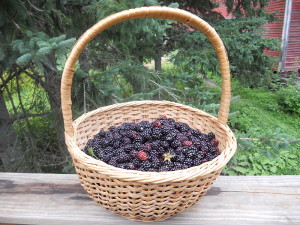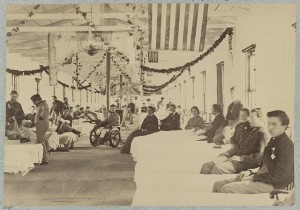a “sovereign balm”
Diarrhea/dysentery was one of the major killing diseases for Civil War soldiers [1]. 150 years ago this week New Yorkers were urged to contribute whatever blackberry products they could to help hospitals fight the sickness.
From The New-York Times August 1, 1864:
Blackberries for Hospitals A Few Words More on the Subject.
WASHINGTON, D.C., Friday, July 29, 1864.
To the Editor of the New-York Times:
A few days since I sent you a communication in behalf of the soldier, appealing to the good people of your State to secure as nearly as possible every remaining blackberry for hospital use. Will you give me the privilege of adding what seems to be necessary to what was then said?
First, in regard to the manner of putting them up. Let me say to all, do not send your jelly in thin glass, as many have done, but in very thick glass or earthern jars, closely and tightly covered. Let the syrup be put up in thick bottles, tightly corked. Let the cordial, wine and brandy be put up in the same way. The aid societies and branch commissions, to whom these jars and bottles are sent, will please pack them in cloths, fit for bandages, handkerchiefs, &c,; then nothing else is Injured in case of a leakage, and these cloths will at all times be very useful. They are very much needed now.
Directions were given in my former letter for making blackberry brandy only; not because more of this is wanted than of the syrup, wine or cordial, but because people generally are not supposed to know so well how to make it. From the following, it will be seen that the cordial is nearly the same, only richer, with half the proportion of brandy:
BLACKBERRY CORDIAL.
To one gallon of blackberry juice put four pounds white sugar; boil and skim off; then add one ounce of cloves, one ounce of cinnamon, ten grated nutmegs, and boil down till quite rich; then let it cool and settle; afterward drain off, and add one pint of good brandy.
The wine and jelly is made in the same manner as currant wine and jelly. Almost all housekeepers are familiar with the modes of making these. The syrup is made like the jelly, but not so rich — only rich enough to keep well. Let it become cold before pouring it into bottles. If it should form jelly, heat it over, and put it up in jars. A gallon of syrup or jelly may save as many lives as the same quantity of cordial, wine or brandy; for, if stimulants are needed, they may be given to the patient separately. We know that at the present price of sugar and spices, the putting up of any of these curatives for the soldier is expensive work; but we ask each and all to do only so much as they are able, and we ask them to do this to the exclusion of everything else, now while the blackberry season is passing away.
I speak the sentiments of all connected with commissions and hospitals, in saying that the entire present fund of any aid society cannot be better invested than in the purchase of berries, spices and sugar for the preparation of these articles. One of our best hospital surgeons remarked to-day that he should have as much need of blackberry curatives all through the Fall as now, and that all seasons called for large quantities of them.
The greater part of yesterday your correspondent spent in visiting a few of the wards in Lincoln Hospital, and as in all others, and at all other times, testimony in favor of the blackberry was constantly coming up and in a great variety of ways. [several examples of surgeons and patients requesting blackberry products} …
Chancing to go in company with a lady relief agent from New-York, into a room where the Sisters of Charity, employed in this hospital as nurses, were assembled, I heard her say to them: “Which of you very much need a bottle of blackberry brandy for severe cases of diarrhoea?” and heard nearly all quickly answer I. Almost everyone had some patients of this kind, although there is a ward set apart especially for such cases. Very much to her regret, the lady-agent had only a single bottle then to leave with them. The Sister Superior took it in charge, I think, to deal it out in small quantities to the others. But who imagines that this one bottle could supply the needs of all?
O! my sisters, and friends everywhere, do be preparing to send to hospitals everywhere, this sovereign balm, for this wide-spread and fearful disease.
Send it through the Sanitary Commission, or the Christian Commission, or the Relief Agency of your State, as you please — only do not fail to send it. In the name of all that is sacred, send it. S.B.S.
Gandydancer’s blackberry photo is licensed by Creative Commons
- [1]McPherson, James M. The Battle Cry of Freedom: The Civil War Era. New York: Ballantine Books, 1989. Print. pages 487-88.↩


